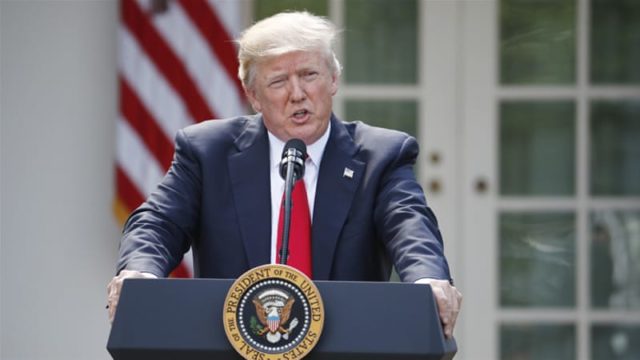
Editor's Note (12/4/2018): As 19 of 20 world leaders at the G-20 summit pledged to "fight climate change," we reviewed our 2017 article praising President Trump's decision to leave the Paris Climate Accord. Nothing in the intervening year changes our mind about the role of amorphous world-wide treaties that seek to bind the US to large expenditures uncontrolled by our Congress, while giving a pass to the world's greatest polluters - India and China. We would further note that the earth's climate has been changing for as long as we are able to understand it, so the utility of the current accord remains unclear.
Groucho Marx famously said he wouldn’t be a member of any club that would have him as a member. The same is true of the Paris Climate pact.
With the accession of Nicaragua and Syria, the United States stands alone outside the club. Its members largely break down into groups. There are the world’s largest polluters (India, Russia, China). There are the developed countries that work to control their own pollution and emissions but make only minor financial contributions (most of Western Europe and parts of Asia). There are poor countries that want handouts. And then there is Syria, a criminal regime, which gets its own group. (It appears chemical weapons are not considered “pollutants” — unless you breathe them.)
And us.
The goals of the pact are strikingly modest — a voluntary commitment to limit global warming to 2 degrees Celsius above pre-industrial levels — but the withdrawal of the United States was followed by frenzied despair for the future of the planet. Germany, France and Italy announced: “We deem the momentum generated in Paris in December 2015 irreversible and we firmly believe the Paris Agreement cannot be renegotiated, since it is a vital instrument for our planet, societies, and economies.”
The European Commission president decried the abdication of American leadership, saying the U.S. wanted to “untie itself from international connections.” Heavy words for an agreement that was not ratified or even discussed by the U.S. Senate, which answers to the American people, not the European Commission.
But here is where America shines.
A dozen American states and more than 200 cities have committed themselves (or their constituents) to maintaining the principles and goals of the Paris pact. More than 1,000 companies and institutions, including more than a dozen Fortune 500 businesses, signed a statement joining them.
Whether they planned it this way or not (probably not), they have exercised a fascinating burst of American federalism.
Federalism is how states and municipalities exercise their authority separate from the federal government. For decades, liberals have sought more federal power over states (abortion, marriage, health insurance, and bathrooms), while conservatives have argued for less.
Not this time.
The determination of state, local, and business leadership to forge ahead on standards for conservation, energy, and pollution control is an outstanding development that does not require the federal government and appears not to run afoul of federal law (unlike, for example, sanctuary cities). The question is not whether it is better to have or not have clean air and water; not whether to find better ways of managing waste and generating electricity or not find them. There are only two questions:
- Who will do the heavy lifting for what we all consider benefits? Certain states, cities and companies say they will, and more power to them, so to speak. American ingenuity and capability will surely create better and smarter ways to live in the only atmosphere we have.
- What constitutes the best use of American money in pursuit of those aims?
Technology doesn’t create itself, and the role of government and private investment choices looms large. The federal government has a poor track record of choosing investments. (Solyndra, anyone?) The market, from startups to Fortune 500 companies, is the better mechanism for emerging and adaptive technologies. Wayze (Israeli) and Amazon and Uber (American) come to mind.
Absence of a market, or investment mechanism or money for the sort of innovation at which America excels is a major shortcoming of the Paris pact. Consider the founding document the Europeans adamantly oppose changing.
Wealthy countries pledged $100 billion annually a “Green Climate Fund.” The Obama administration put $1 billion of a $3 billion pledge into the pot; the Europeans, in total, have put $40 million. The polluting group — China, Russia, and India — have offered nothing. The goal of the fund is “help[ing] developing countries move away from fossil fuels and use more renewable power supplies… To reach these ambitious goals, appropriate financial flows, a new technology framework and an enhanced capacity building framework will be put in place, thus supporting action by developing countries and the most vulnerable countries, in line with their own national objectives.”
That is to say, the financial flows from America and other developed countries to provide retail assistance in “new technology” to poor countries — solar panels, wind farms — in line with “their national objectives,” not those of the donor countries. This provides a big boost to China — polluting, not paying, the world’s primary provider of solar panels, and willing to undercut Western companies on price (Solyndra, anyone?). There is no requirement that less developed countries spend any of their own money, which is a recipe for corruption.
The United States has no obligation to fund anyone else’s program — or Chinese industry. American states, cities, and entrepreneurs are likely better incubators of technologies that will advance clean and sustainable energy than multi-lateral institutions with lots of rules and no controls.
A club of one is fine.





